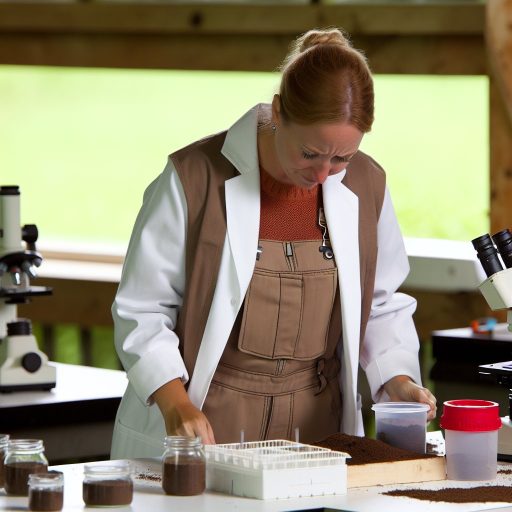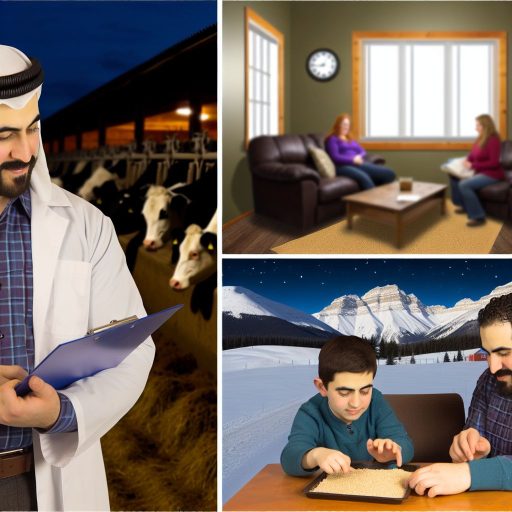Understanding Seed Technology
Overview of Seed Technology
Seed technology encompasses the scientific study of seeds and their applications in agriculture.
This field focuses on improving seed quality, production, and distribution.
Advancements enhance crop performance and sustainability.
Moreover, seed technology plays a critical role in food security globally.
Importance of Seed Technology in Agriculture
Seed technology significantly impacts agricultural yields.
High-quality seeds contribute to healthier crops.
Farmers benefit from increased resistance to pests and diseases.
This technology also enables the development of biofortified crops.
Furthermore, it supports the adaptation to changing climate conditions.
Applications of Seed Technology
Seed technology is applied in various ways throughout the agricultural process.
It includes seed breeding, seed testing, and seed production techniques.
Each application aims to optimize growth and maximize yield.
Additionally, technology aids in the preservation of genetic diversity.
Farmers leverage these advancements for better crop management strategies.
Future Trends in Seed Technology
The future of seed technology looks promising.
Innovations like gene editing offer new avenues for crop improvement.
Sustainable practices are gaining traction among researchers and farmers alike.
Furthermore, the integration of data analytics enhances decision-making.
As technology evolves, it will continue to shape the agricultural landscape.
Educational Pathways
Relevant Degrees in Seed Technology
A degree in agriculture can be an excellent starting point for your career in seed technology.
Consider pursuing a bachelor’s degree in plant science or agricultural science.
Some universities offer specialized programs focusing on seed technology.
Alternatively, a degree in biology or biochemistry may also be beneficial.
Postgraduate Studies and Research Opportunities
Many professionals enhance their careers through advanced degrees.
A master’s or PhD in plant breeding or genetics can provide an edge.
Unlock Your Career Potential
Visualize a clear path to success with our tailored Career Consulting service. Personalized insights in just 1-3 days.
Get StartedThese programs often include valuable research opportunities.
Join a research project to gain hands-on experience.
Certifications and Training Programs
Certifications can enhance your expertise in seed technology.
Look for programs that focus on seed production and management.
The Canadian Seed Institute offers valuable training resources.
Other organizations provide workshops on seed testing and quality assurance.
Consider obtaining a certification in plant pathophysiology as well.
Internships and Practical Experience
Practical experience is crucial in this field.
Seek internships with agricultural companies or research institutions.
These opportunities allow you to apply theoretical knowledge.
Moreover, they enable you to network with industry professionals.
Continuous Education and Workshop Participation
In the fast-evolving field of seed technology, continuous education is vital.
Participate in workshops and conferences to stay updated.
Join professional associations to access resources and courses.
Networking at events can lead to potential job opportunities.
Exploring Career Opportunities in Seed Technology
Overview of Seed Technology Roles
Seed technology encompasses various roles within the agricultural sector.
Professionals in this field work to improve seed quality and performance.
They interact with researchers and farmers to enhance agricultural productivity.
Moreover, they focus on developing disease-resistant and high-yield seeds.
Key Roles in Seed Technology
An individual can pursue several roles in seed technology.
Here are some common positions:
- Seed Research Scientist
- Seed Production Manager
- Plant Breeder
- Quality Control Analyst
- Sales and Marketing Specialist
Responsibilities of Seed Research Scientists
Seed research scientists play critical roles in innovation.
They conduct experiments to develop new seed varieties.
Additionally, they analyze data to improve existing strains.
They also collaborate with agronomists on field trials.
This work directly influences crop yields and sustainability.
Seed Production Management
Seed production managers oversee the cultivation of seeds.
Their responsibilities include planning and coordinating production schedules.
They must ensure compliance with agricultural regulations.
Quality control is paramount in their activities.
Training and supervising staff is also part of their duties.
Essential Skills in Seed Technology
Professionals need a diverse skill set to excel in this industry.
- Strong analytical skills for research evaluation
- Effective communication skills for teamwork
- Knowledge of plant genetics and breeding methods
- Understanding of agricultural practices and technologies
- Project management skills for overseeing initiatives
Career Pathways in Seed Technology
Individuals often start as interns or research assistants.
They gain hands-on experience in seed production or quality analysis.
Progression may lead to specialized roles or management positions.
Networking with industry professionals is crucial for advancing careers.
Continuing education and certifications can enhance skills.
Gain More Insights: Understanding Seed Germination and Viability Testing
Key Skills Required
Technical Skills for the Seed Industry
A strong foundation in biology enhances your prospects in seed technology.
Understanding genetics is crucial for developing new seed varieties.
Crop management knowledge helps optimize agricultural practices.
Familiarity with laboratory techniques increases efficiency in research.
Proficiency in data analysis assists in interpreting research results.
Knowledge of sustainable practices is becoming increasingly important.
Experience with plant breeding techniques is a valuable asset.
Soft Skills for Success
Effective communication fosters collaboration among team members.
Problem-solving ability helps navigate challenges in the industry.
Adaptability is essential in a rapidly evolving agricultural landscape.
Critical thinking enhances decision-making capabilities.
Strong organizational skills contribute to project management success.
Leadership qualities inspire teams to achieve their goals.
Networking skills create connections for future opportunities.
A passion for innovation drives progress in seed technology.
The Importance of Continuous Learning
Staying abreast of industry trends is essential for long-term success.
Participating in workshops helps refine existing skills.
Pursuing additional certifications can boost career advancement.
Engaging with professional organizations provides valuable resources.
Researching new technologies keeps you at the forefront of the field.
Building a personal library of industry literature enhances knowledge.
Discover More: How Arborists Diagnose and Treat Tree Diseases
Networking and Professional Associations: Building Connections in Seed Technology
Understanding the Importance of Networking
Networking plays a vital role in building a successful career in seed technology.
It opens doors to job opportunities and mentorship.
Moreover, networking allows for the exchange of ideas and knowledge.
Connecting with industry professionals can lead to collaborations and partnerships.
Essentials of Professional Associations
Joining professional associations can enhance your career prospects.
These organizations often provide valuable resources and training opportunities.
Furthermore, they facilitate access to industry events and conferences.
Membership can also strengthen your professional credibility and visibility.
Key Professional Associations in Canada
Consider joining organizations like the Canadian Seed Trade Association (CSTA).
The CSTA advocates for the seed industry and promotes innovation.
Another notable association is the SeedScience Association of Canada.
They focus on research, development, and promotion of seed technology.
Strategies for Effective Networking
Start by attending local events and workshops in your area.
Engage with speakers and fellow attendees to foster connections.
Additionally, utilize online networking platforms like LinkedIn.
Follow professionals and participate in discussions relevant to seed technology.
Building Lasting Relationships
Follow up after meeting new contacts to maintain connections.
A simple email expressing gratitude can go a long way.
Consider scheduling informational interviews with industry leaders.
This allows you to gain insights while expanding your network.
Leveraging Social Media for Networking
Social media platforms can be powerful tools for networking.
Join groups focused on seed technology to share and acquire knowledge.
Post articles and updates to engage your connections regularly.
This practice keeps you on the radar of industry professionals.
Participating in Industry Conferences
Conferences provide excellent venues for networking.
Attend sessions and engage in conversations with speakers and experts.
Participating in workshops can also enhance your skills and knowledge.
Be proactive in introducing yourself and your background.
Delve into the Subject: Career Benefits of Pursuing Soil Science in Canada

Internships and Practical Experience: Gaining Hands-On Knowledge in Seed Technology
The Importance of Internships
Internships provide vital experience in the seed technology field.
They allow students to apply theoretical knowledge practically.
Many companies look for interns with relevant hands-on experience.
Furthermore, internships help build a professional network.
Finding Suitable Opportunities
Research local agricultural firms, universities, and research institutions.
Many organizations in Canada offer internship programs in seed technology.
For instance, organizations like Agri-Food Canada and crop breeding companies are great places to start.
Additionally, consider attending industry conferences or job fairs.
Types of Practical Experiences
Engage in various practical experiences related to seed technology.
Fieldwork provides insights into crop cultivation and management practices.
Laboratory work allows exploration of seed testing and quality assessment.
Research projects offer chances to study innovative seed technologies.
Building Skills During Internships
Internships help develop key skills essential for a successful career.
Communication skills are enhanced through teamwork and interactions.
Technical skills improve as interns learn to operate specialized equipment.
Problem-solving abilities grow through real-world challenges encountered.
Networking and Professional Growth
Internships offer opportunities for networking with industry professionals.
Build relationships that may lead to future job opportunities.
Moreover, mentors can provide guidance and support in career development.
Stay engaged and proactive to maximize these connections.
See Related Content: Career Growth and Advancement for Canadian Soil Scientists
Regulatory Framework
Overview of Seed Regulations in Canada
Canada has a comprehensive regulatory framework for seed technology.
This framework ensures the safety and quality of seeds used in agriculture.
The main bodies involved include the Canadian Food Inspection Agency and Health Canada.
Regulations cover everything from seed quality to genetic modification.
Key Legislation Affecting Seed Technology
Several key laws govern seed technology in Canada.
- The Seeds Act sets minimum standards for seed quality.
- The Plant Breeders’ Rights Act protects new plant varieties.
- The Fertilizers Act regulates fertilizers used with seeds.
Additionally, the Environmental Protection Act addresses potential environmental impacts.
Compliance and Certification
Compliance with regulations is essential for businesses in seed technology.
Companies must obtain proper certification to market their seeds.
The certification process typically involves testing for purity and germination rates.
Regular inspections ensure ongoing compliance with the established standards.
International Trade Considerations
Seed technology regulations also affect international trade.
Canada must align its regulations with international standards.
For instance, the World Trade Organization sets guidelines for trade practices.
Compliance helps Canadian businesses access global markets.
Future Trends and Developments
The regulatory landscape for seed technology continues to evolve.
Emerging technologies like gene editing are prompting updates to existing laws.
Stakeholders must stay informed about these changes to remain compliant.
Engaging with industry associations can provide valuable insights and advocacy.
Industry Trends and Innovations: Staying Updated on Advances in Seed Technology
Emerging Technologies
Innovations in seed technology are revolutionizing agriculture in Canada.
Precision breeding techniques enhance yield and disease resistance.
Additionally, genetic engineering introduces traits for increased climate resilience.
Moreover, CRISPR technology allows for precise genetic modifications.
Market Trends
The seed market is evolving rapidly due to consumer preferences.
Organic and non-GMO products are in high demand across the country.
Furthermore, sustainable farming practices influence seed development priorities.
Investments in biotech firms reflect growing interest in innovative seed solutions.
Regulatory Framework
Regulations play a crucial role in the seed technology landscape.
Health Canada oversees safety assessments for new seed products.
Additionally, the Canadian Food Inspection Agency monitors seed quality standards.
Staying informed about regulatory changes is essential for professionals in the field.
Collaboration and Research
Public-private partnerships drive advancements in seed research.
Universities collaborate with companies to develop cutting-edge varieties.
Research institutions also focus on breeding techniques that promote sustainability.
Sharing knowledge among sectors strengthens the entire industry.
Workforce Development
As technology evolves, so does the need for skilled professionals.
Educational programs are adapting to include seed technology training.
Internships provide hands-on experience in seed development and innovation.
Networking opportunities exist in conferences and seminars across Canada.
Additional Resources
Leadership and innovation in seed identification
Careers, jobs and internships in the space sector | Canadian Space …




